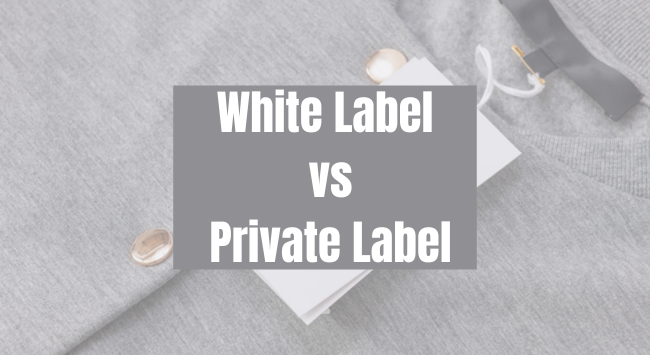
What’s the Difference Between White Label vs Private Label

In the competitive world of retail and marketing, businesses need to constantly consider new strategies to differentiate themselves from their competitors. One such way is through product labeling options like white label and private label products.

Both approaches allow retailers to offer unique products tailored to specific audience needs, but they come with distinctive features, advantages, and disadvantages. In this blog post, we will delve into the key differences between selling white label vs selling private label products – exploring their definitions, pros and cons, as well as how to choose the best option for your business goals.
Understanding White Label Vs Private Label
To better understand the difference between white label vs private label, it’s important to first define each term and highlight the key differences in ownership and control, customization and branding, pricing and profit margins.
Definition Of White Labeling And Private Labeling
White labeling refers to a practice where a product or service is produced by one company and rebranded by another company for sale. In the context of food manufacturing, white-label products are generic items created in mass quantities that can be purchased and rebranded by multiple retailers.
On the other hand, private labeling involves creating exclusive products tailored specifically for one retailer or brand. This means that the manufacturer creates unique recipes, formulations, or packaging designs according to their client’s specific requirements.
For instance, working closely with a chocolate producer to develop an exclusive premium dark chocolate bar recipe sold exclusively at your gourmet grocery store showcases private labeling.
Key Differences Between White Label Vs Private Label Products

In this section, we will explore the key differences between white label and private label products, highlighting the unique aspects of each to help food manufacturers make informed decisions when choosing between the two options.
| White Label Product | Private Label Product |
| Generic products sold by manufacturers to multiple retailers | Customized products created by a private label manufacturer exclusively for one retailer |
| Less room for customization and branding | Greater customization options and control over branding |
| Typically lower cost than private label business model | Often more expensive due to increased customization and exclusivity |
| Commonly used for software products | Mainly used for physical products, including food items |
| Less control over pricing and profit margins | Greater control over pricing strategies and potential for higher profit margins |
| Allows retailers to enter the market quickly and at a lower cost | Requires more investment and resources for customization and branding |
By understanding these differences, food manufacturers can better determine the right approach to meet their specific goals, target audience, and resources while considering market needs and competition.
Ownership And Control, Customization And Branding, Pricing And Profit Margins
When it comes to owning and controlling your product line, a private label brand is the way to go. With private label companies, you have full control over branding, customization options, and pricing strategy.
Retailers who opt for white label products typically do not own any portion of the supply chain or manufacturing process. This means that they do not have exclusive rights to the product – multiple retailers could be selling the same exact thing with their own label attached.
On the other hand, with private label brands, you can differentiate your products from competitors in a crowded market by adding unique touches that cater specifically to your target audience’s preferences.
Example: A food manufacturer has decided to create its line of organic snacks tailored towards health-conscious consumers in their 20s-30s demographic. By opting for private label production services, they can customize their packaging design with eye-catching graphics and taglines that speak directly to this audience segment’s concerns about healthy eating habits.
They can even develop innovative flavor profiles based on market research data showing which flavors resonate most strongly with this age group (e.g., avocado toast-flavored chips).
How To Choose Between White Label Vs Private Label
To make the right choice between white label vs private label, it is essential to identify your goals and target audience, consider your budget and resources, research and evaluate suppliers, and determine the level of control desired over branding and pricing – read on to learn more about making an informed decision for your business.
Identify Your Goals And Target Audience
Before deciding whether to use white label or private label products, it’s important for food manufacturers to identify their goals and target audience.
It’s also crucial to know who your target audience is in order to make informed decisions about the type of branding, pricing, and packaging that will appeal most to consumers.
Consider Your Budget And Resources
Before deciding between white label vs private label, it’s important to consider your budget and resources. White labeling can be a more cost-effective option as manufacturers sell generic products to retailers under these agreements, allowing for lower pricing and higher profit margins.
For example, let’s say you have a food product with limited funds but want to offer unique products that stand out in a competitive market. A white label manufacturer may be the way to go as it provides standard products at an affordable price point while still allowing for some branding customization. Although, private label manufacturing will allow for more control and flexibility in the long run.
In conclusion, it’s essential to evaluate both your budget and resources before making any decisions on white label vs private label as they can significantly impact revenue generation outcomes based on consumer preferences within specific markets.
Research And Evaluate Suppliers
Researching and evaluating suppliers is crucial when deciding between white label vs private label products. Here are some steps that food manufacturers can take:
- Identify potential suppliers: Look for suppliers online, at trade shows or through referrals from industry peers who have used or know of their private label services.
- Evaluate supplier capabilities: Check if the supplier has experience in producing the type of product you want to launch. Ask for samples, visit their manufacturing facility, and check their quality control process.
- Consider supplier pricing: Get quotes from multiple suppliers and compare prices to ensure that you’re paying a fair price for the quality of the product.
- Examine the supplier’s supply chain management: Ensure that your chosen supplier has a reliable supply chain with good relationships with their own suppliers to avoid any supply chain disruption.
- Consider packaging options: Ask about different packaging options available and how flexible they are in customization and branding.
- Evaluate their marketing strategy: Understand what marketing support they can provide to help grow your brand awareness or increase sales.
By taking these steps, food manufacturers can make informed decisions when selecting white label or private label products, ensuring high-quality products that meet consumer demand and generate revenue for your business.
Consider Market Needs And Competition
To effectively choose between white label vs private label, it’s important to consider the current market needs and competition. You should research what products are currently in demand and what your competitors are offering.
For example, let’s say you’re a food manufacturer looking to introduce a new line of snacks. If several of your competitors are already selling similar products under their private labels, you might find success by focusing on creating unique flavors or packaging that stands out from the crowd.
Evaluate Resources And Capabilities
To choose between white label and private label, food manufacturers need to evaluate their resources and capabilities. This includes assessing their production capacity, supply chain management, quality control standards, and brand positioning.
Manufacturers should consider whether they have the resources to produce and distribute customized products under a private label agreement or if it’s more feasible for them to sell generic products under a white label agreement.
Additionally, food manufacturers should assess their marketing strategy and distribution channels as this can impact their decision between private labeling or white labeling.
If they have established partnerships with specific retailers or distributors, then offering private label products tailored to those partners may be more advantageous than selling generic products through multiple channels under a white-label agreement.
Determine The Level Of Control Desired Over Branding And Pricing
One of the most crucial factors to consider when choosing between white label and private label is how much control you want over your branding and pricing. With white labeling, you may not have as much control since the manufacturer already has an established brand that they sell to multiple retailers.
However, with private labeling, you have greater flexibility in customizing your product’s packaging and overall presentation to align with your unique branding strategy.
Additionally, pricing can be a major consideration for any food manufacturer looking to maximize profits. While white label products are typically cheaper than their private labeled counterparts due to more generic packaging and less customization options, this doesn’t mean that there aren’t opportunities for margins on both sides.
Ultimately, it is up to each food manufacturer individually which type of labeling best suits their business goals and budget constraints while also taking into account the competition within their respective markets.
Conclusion
In conclusion, understanding the difference between white label vs private label is crucial for any food manufacturer looking to expand their product line. White labeling offers affordability and simplicity, while private labeling provides greater control over branding and customization.
When deciding between these options, it’s important to consider your goals and target audience, as well as budget, resources and market competition. Ultimately, the choice between white or private labeling will depend on your company’s unique needs and capabilities.
FAQs:
1. What is white label branding?
White label branding refers to when a company purchases pre-existing products or services from a manufacturer and rebrands them with their own logo and labeling before selling them as their own.
2. What is private label branding?
Private label branding involves a company creating its own unique product line, which is manufactured by another company. The resulting products are sold under the company’s brand name exclusively.
3. What’s the difference between white label vs private label?
The main difference between a white label provider and private label manufacturers is that in white labeling, companies buy pre-existing products and simply apply their own branding to sell as their own whereas, in private labeling, companies create a whole new product line of their own to be manufactured for them under exclusive rights.
4. Which one should I choose – White Label or Private Labeling?
Choosing between white-labeling and private-labeling depends on your business goals and resources available for investment among other various factors including budget constraints, staffing availability etc. Ultimately it comes down to what you want- control over everything (private), or just having access without investing too much time/efforts (white).
For more Information Visit Our website.



